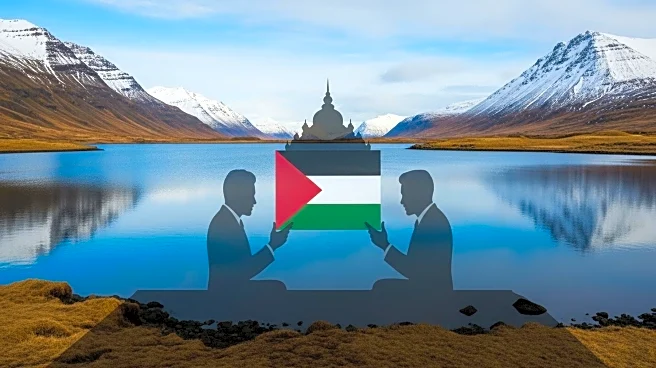What's Happening?
The Palestinian Minister of Foreign Affairs, Dr. Varsen Aghabekian, recently visited Iceland to engage in high-level discussions with Icelandic officials, including Foreign Minister Þorgerður Katrín Gunnarsdóttir and Prime Minister Kristrún Frostadóttir. The talks centered on the humanitarian situation in Palestine and the progress towards a ceasefire in Gaza. The discussions also touched upon the growing international recognition of Palestinian statehood. This visit follows a previous meeting at a UN conference in New York, where the two-state solution was addressed. Dr. Aghabekian, the first woman to serve as Palestine's foreign minister, also participated in the Imagine Forum peace conference hosted by the University of Iceland.
Why It's Important?
The discussions in Iceland are significant as they highlight international efforts to address the ongoing humanitarian crisis in Gaza and support the recognition of Palestinian statehood. Iceland's involvement underscores its commitment to global peace initiatives and its support for an independent Palestine. The talks may influence other nations to take similar stances, potentially impacting international relations and peace efforts in the Middle East. Iceland's pledge to contribute to Gaza's reconstruction and support peace in the West Bank could have long-term implications for regional stability.
What's Next?
Iceland's continued advocacy for Palestinian statehood and reconstruction efforts in Gaza may lead to increased diplomatic engagements with other nations. The outcomes of these talks could influence future international policies and aid strategies aimed at resolving the conflict in the region. Iceland's role in these discussions may also enhance its position as a mediator in international peace efforts.
Beyond the Headlines
The visit and discussions may also reflect broader geopolitical shifts, as smaller nations like Iceland take active roles in global peace processes. This could lead to a reevaluation of traditional power dynamics in international diplomacy, where smaller states contribute significantly to conflict resolution.









